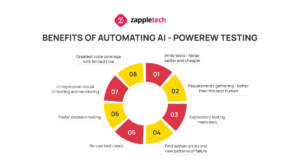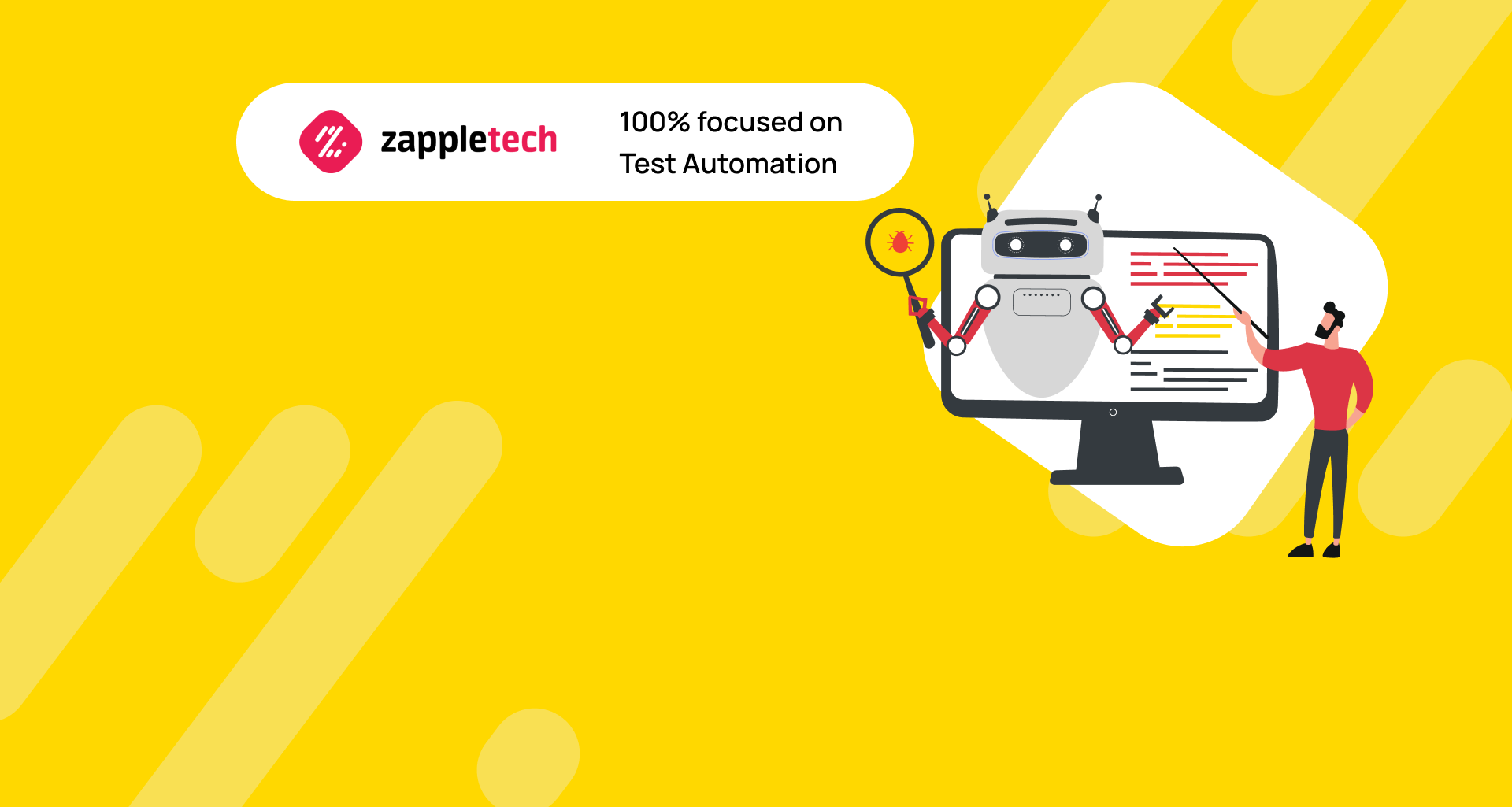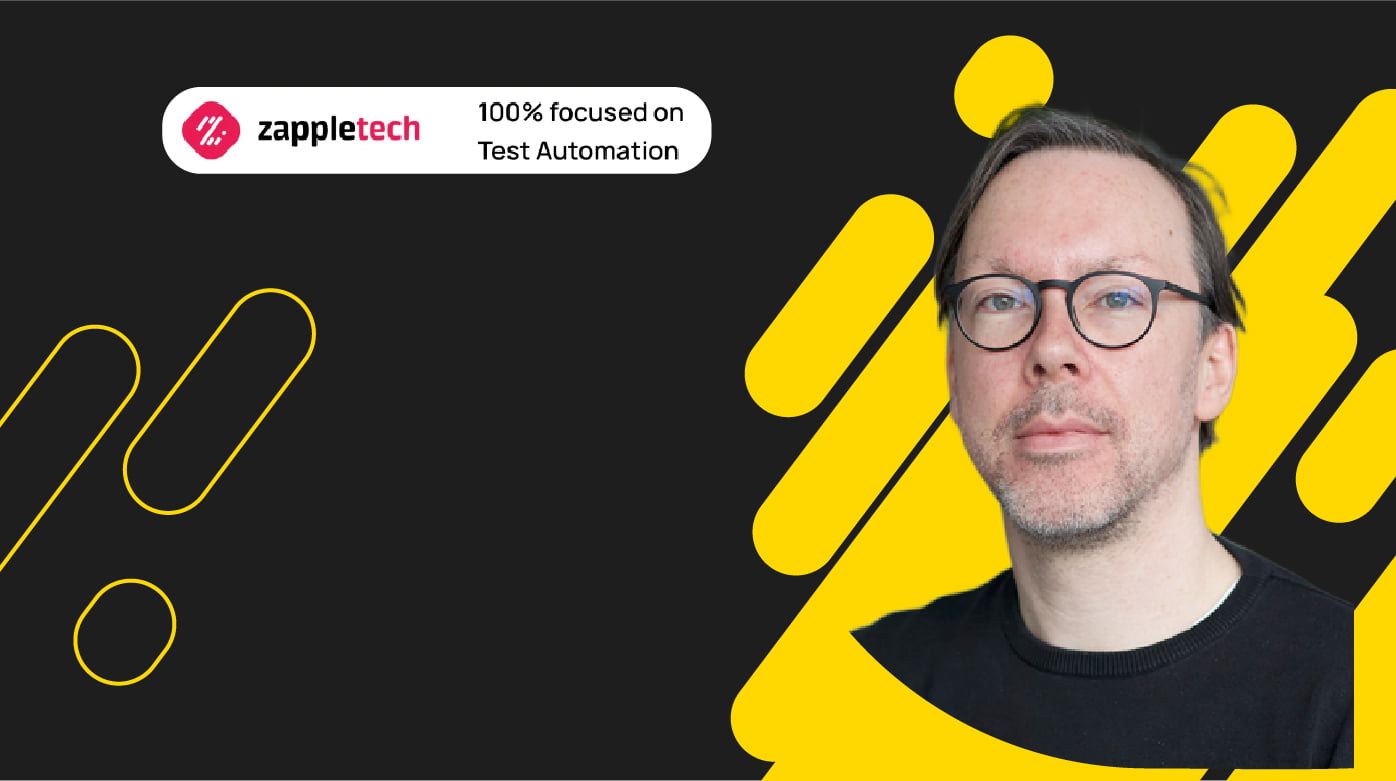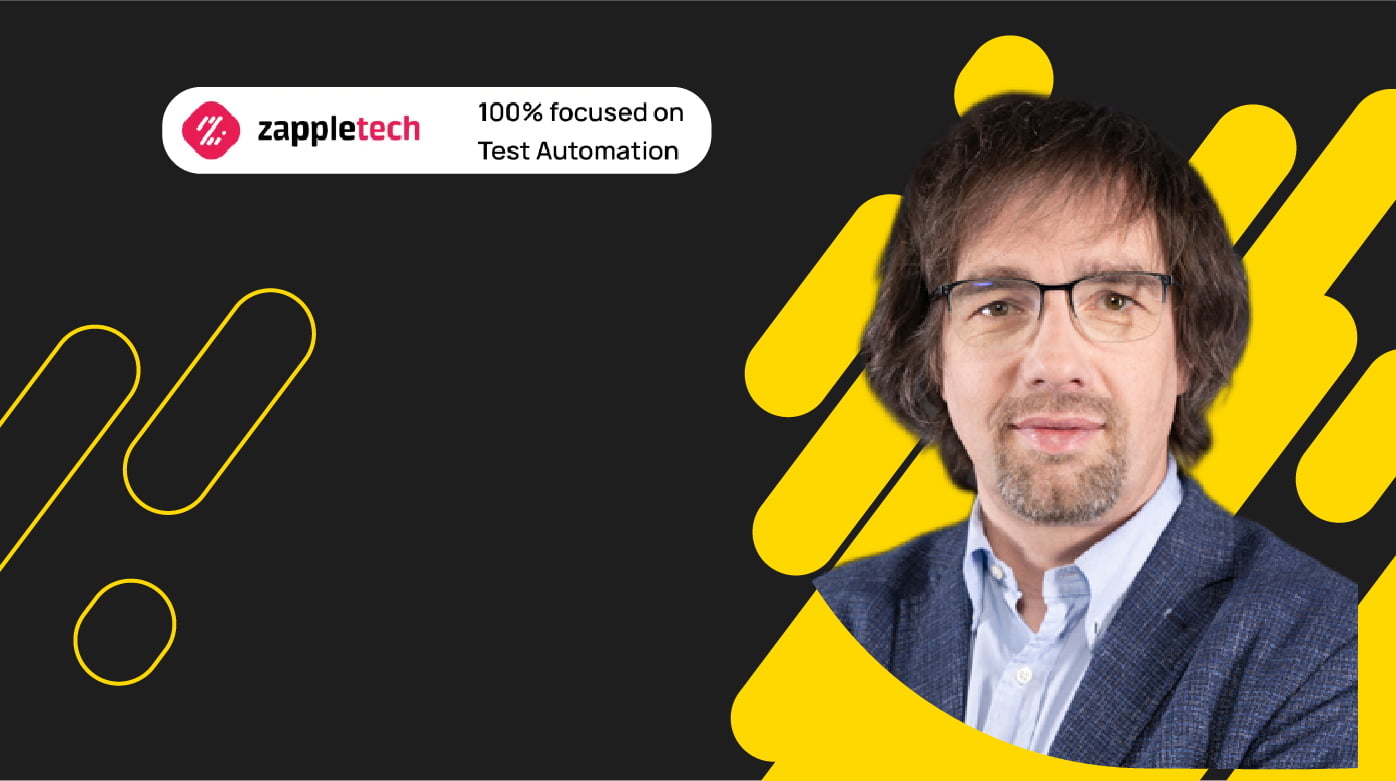Software testing and quality testing have become an integral part of developing and maintaining an app or any program. Applications interact with each other through APIs, use legacy systems, and become more complex every day in a non-linear manner. As these complexities grow, the challenges in testing also increase, demanding more advanced solutions.
With the rise in complexity, systems often encounter a significant number of additional problems and nuances, making the testing process more complicated. To address these challenges, the introduction of new tools and methods has become essential. One prominent solution is the use of AI in automation testing, which leverages artificial intelligence to streamline and enhance the testing process. AI in automation testing not only improves efficiency by reducing manual effort but also enhances accuracy by identifying potential issues that traditional testing methods might overlook. By integrating AI in automation testing, organizations can better manage the complexities of modern software systems, ensuring robust and reliable performance.
Use AI-driven tools to automatically generate and update test cases based on application changes. This approach reduces the manual effort involved in maintaining test suites and ensures that your tests stay relevant as the application evolves.Mykhailo PoliarushCEO, ZappleTech Inc.
Table of Contents
A New Era Is Coming
The era of AI in automation testing has already arrived, and its impact is transformative. AI approaches, which have been practiced for several years, are now becoming integral to the testing landscape. More specifically, AI combined with machine learning (ML) is revolutionizing testing processes. Machine learning is a technology designed to recognize patterns and predict future trends based on received data. This ability to analyze vast datasets and identify trends provides significant advantages in testing, allowing testers to anticipate potential issues before they occur. By harnessing AI in automation testing, organizations can enhance accuracy, reduce manual effort, and accelerate testing cycles, ultimately leading to faster, more reliable software delivery. As the integration of AI in automation testing continues to evolve, it is setting new benchmarks for efficiency and innovation in the testing industry.
Why is AI in Test Automation a Good Idea?

High Accuracy
No person is immune from mistakes. Without exception, even the most experienced and smart software testers are subject to them, especially when forced to perform dreary and monotonous work. Repetitive tasks increase the likelihood of errors, which can affect the quality and reliability of the software being tested.
This is where AI in automation testing plays a crucial role. By leveraging AI, test automation can significantly reduce the impact of the human factor. It ensures that the same actions are performed consistently without deviation, providing high accuracy and a detailed record of results. AI-driven tools can handle vast amounts of data and execute complex test cases far more efficiently than manual efforts, allowing teams to focus on higher-value tasks like creating new products and refining test strategies. The incorporation of AI in automation testing not only enhances accuracy but also accelerates the testing process, leading to faster release cycles and improved software quality.
It Saves Time and Money
Go Beyond Manual Testing
Imagine a website test with over a thousand users. This is tremendous work that takes a lot of time and effort, and without AI in automation testing, it would be an incredibly difficult task. By leveraging AI in automation testing, companies can go beyond manual testing limitations, significantly reducing the time and resources needed to conduct large-scale tests.
AI-driven test automation allows you to simulate thousands, hundreds, and dozens of virtual users who can interact with web applications, software, and network applications. This not only enhances the efficiency of testing but also increases the accuracy of identifying potential issues. AI in automation testing can adapt to changes in real-time, ensuring that the test scenarios remain relevant even as the application evolves. This advanced approach helps organizations quickly pinpoint bugs, optimize performance, and improve user experience, all while minimizing human error and the need for extensive manual intervention.
Expands the Scope of Testing
Expanding the scope of testing is one of the key benefits of AI in automation testing. AI-powered test automation tools not only streamline the testing process but also enable a broader coverage by exploring various program aspects that manual testing might overlook. For example, these tools can analyze user behavior patterns, identify edge cases, and detect performance issues that would otherwise go unnoticed. They capture additional factors such as load, response time, and integration points, ensuring a more comprehensive analysis. This expanded scope leads to more robust and reliable software, as AI in automation testing continuously adapts and learns from new data, enhancing the overall quality and efficiency of the testing process.
User-Friendly
5 Ways How to Use AI in Automation Testing
Visual Automated Testing
Visual testing is a critical aspect that often requires human oversight to ensure that the user interface (UI) looks and functions as intended. However, with advancements in AI in automation testing, developers can now implement machine learning-based testing to detect visual anomalies in software automatically. This type of testing goes beyond simple pixel comparisons; it analyzes the application’s visual elements in the context of the overall UI design, enhancing the ability to spot issues that might be missed by traditional automated testing.
By leveraging AI in automation testing, teams can reveal the visual correctness and objectivity of the application, ensuring that all UI components are displayed as expected across different devices and screen sizes. This approach allows testers to confidently identify and address UI problems quickly, reducing the need for manual checks and improving the efficiency of the testing process. As a result, the integration of AI-driven visual automated testing not only enhances the accuracy of UI validation but also accelerates the software development lifecycle, leading to higher-quality releases.
APIs Testing
APIs testing is a critical aspect of software quality assurance, focusing on the communication and data exchange between two software systems. Unlike traditional UX testing, which primarily examines the user interface and user experience, APIs testing delves deeper into the backend processes, making it more effective in detecting application defects. This is particularly important in scenarios where the functionality of applications heavily relies on accurate data flow and integration between various services.
When implementing APIs testing, it’s crucial for testers to possess a strong technical background and be familiar with the tools required for such tasks. This includes a deep understanding of the specific domain and the relevant technical nuances involved in API functionalities. The growing role of AI in automation testing has further enhanced the efficiency of APIs testing by enabling smarter, faster, and more accurate defect detection, thus reducing the manual effort and time needed.
AI in automation testing also helps streamline the testing process by predicting potential problem areas and suggesting optimal test cases, thereby increasing the overall effectiveness of the tests conducted. As APIs continue to be integral to modern software applications, mastering the skills and tools for effective APIs testing, combined with the power of AI, can significantly improve the quality and reliability of software products.
Domain Knowledge
AI in software testing contributes significantly to enhancing application testing by automating repetitive tasks and optimizing the testing process. For example, AI can assist testers in developing codes and generating test scripts, particularly during the most challenging stages of testing. However, it’s crucial to recognize that a competent tester must also possess sufficient domain knowledge to determine the appropriate balance between manual and automated tests.
Domain knowledge enables testers to understand the intricacies of the application, allowing them to make informed decisions about when to deploy manual versus automated tests. This understanding becomes especially critical when incorporating AI in automation testing, as it helps identify how the application will function and benefit the organization. With AI-driven tools, testers can ensure that the machines generate high-quality, reliable codes, but it’s equally important to retain manual testing capabilities for handling complex or nuanced test cases that automation might not fully address.
Spidering AI
Using spiders has the feature of pointing to your web app from AI tools. It then starts automatically scanning the application by scanning and collecting data.
Over time, tools create a set of data and templates for your application as tests run. Then, AI test automation tools point out potential problems.
In this case, an expert with knowledge of the domain will have to confirm whether the problem flagged by AI is a bug or not. Spider AI can help you understand which parts of your app to test. Simply put, the AI will perform heavy tasks, and the tester will have to check the accuracy of the results.
Robotic Test Automation (RPA)
Robotic process automation (RPA) performs repetitive business processes without human intervention. This helps to automate existing interfaces in IT systems and fully support them. RPA scans the screen, navigates through systems, and identifies and collects data.
Tasks are performed exclusively by bots, and tests can be done using the web, desktop, or mobile applications. In addition, it helps set up test data and run regression tests.
The main benefits of RPA are:
- scalability;
- codeless testing;
- cost savings;
- increased productivity;
- accurate results;
- flexibility.
So AI in software testing can automate half of software testing procedures. For example, testers can use machine learning to teach systems to detect bugs that might go undetected by manual testing.
Top 5 AI Test Automation Tools
However, successful testing automation is impossible without worthy tools. Over the past year, these six AI test automation tools and apps have been in high demand among testers.
TestCraft
TestCraft, an innovative tool powered by Selenium, is designed to streamline regression and continuous testing processes, making it an excellent choice for teams focused on enhancing their testing workflows. By integrating AI in automation testing, TestCraft allows users to significantly reduce the time and effort required to maintain and track web applications, offering a more efficient and effective testing environment.
One of the standout features of TestCraft is its ability to conduct automated graphics tests, which adds an extra layer of validation to the testing process. This capability is particularly beneficial for ensuring that visual elements are functioning as expected across different browsers and devices. Moreover, TestCraft’s user-friendly interface and intuitive design mean that it doesn’t require extensive coding knowledge, making it accessible for testers of various skill levels. By leveraging AI in automation testing, TestCraft helps teams quickly adapt to changes and maintain high-quality standards in their web applications.
Applitools
It is a software platform for visual application management. It also offers a uniquely comprehensive platform that is applicable to a variety of tasks and areas:
- DevOps.
- Digital transformation.
- Manual quality control.
- Design.
- Test Automation
The uniqueness of this tool also lies in the fact that it has computer vision that mimics human eyes and brains. Applitools Eyes captures and analyzes your entire application screen with a single line of code. This tool offers a fast and convenient method of cross-browser testing, with support for all testing environments and languages.
As a result, you have one of the unique and functional AI test automation tools that detect 45% more defects and work 3.8 times more stable, 5.8 times faster.
Functionize
Functionize is a universal tool for all popular types of testing, including functional testing, making it a versatile choice for various testing needs. It stands out by leveraging AI in automation testing, which enhances the speed and accuracy of the tests, making them more reliable. The platform uses advanced machine learning algorithms that allow tests to adapt and improve over time, reducing the need for manual intervention.
One of the key features of Functionize is its ability to quickly create AI-based tests and automatically update them as the software evolves, minimizing maintenance efforts. This tool is highly regarded as the most powerful enterprise AI testing tool/platform in the industry, capable of running thousands of tests within minutes. Furthermore, Functionize integrates seamlessly with existing tools, providing a smooth transition and enhancing the overall efficiency of the testing process by incorporating AI in automation testing, making it an ideal choice for enterprises seeking to optimize their testing strategies.
Sauce Labs
Sauce Labs stands out as a leading tool in the field of automation testing, offering what it claims to be the largest testing cloud with over 800 browser combinations, along with more than 200 mobile simulators and emulators. This extensive support makes it a versatile choice for teams looking to streamline their testing processes across various platforms and devices.
Not only does Sauce Labs provide robust cloud-based test automation, but it also leverages advanced technologies like machine learning and artificial intelligence to enhance testing efficiency and accuracy. The integration of AI in automation testing allows Sauce Labs to deliver smarter test execution and analysis, reducing the time spent on manual testing and minimizing the risk of human error. This makes it one of the most popular solutions for enterprises aiming to optimize their testing strategies through intelligent automation.
Integrate AI in your test automation frameworks to enable self-healing tests that can adapt to UI changes without human intervention. This reduces the downtime caused by broken tests and increases the stability of your automation suite.Mikhail BodnarchukCDO, ZappleTech Inc.
Testim
Testim is a powerful tool that leverages machine learning to create, execute, and manage automated tests, making it a standout option in the realm of AI in automation testing. This tool is particularly effective for functional, end-to-end, and user interface testing, providing robust solutions that adapt and improve over time.
One of the key advantages of Testim is its ability to learn and become smarter with each test run, significantly enhancing the stability of test suites. By utilizing machine learning algorithms, Testim can identify patterns, predict potential failures, and optimize test execution, ensuring more reliable results. Testers also have the flexibility to use JavaScript and HTML to write complex programming logic, making Testim a versatile choice for both technical and non-technical users alike in the landscape of AI in automation testing.
AI in Automation Testing: Final Words
With each passing day, as AI permeates the software development life cycle, organizations are still considering whether or not they should fully incorporate it into their product development practices. But statistics and practice show that AI-based test automation will gain momentum and prospects.
AI in automation testing is already proving its worth by enhancing processes across various types of testing, including API, visual, and spidering. This approach not only makes testing faster and more accurate but also introduces greater diversity in testing scenarios, significantly freeing the hands of testers. The integration of AI in automation testing tools, especially functional ones, streamlines the workflow and allows testers to focus on more complex tasks, reducing manual effort and the potential for human error. The continual evolution of AI-driven solutions is poised to transform the landscape of software testing, making it an indispensable part of the development process.
ZappleTech is a company that knows everything about functional testing, AI, and Machine Learning and the use of these technologies. We provide high-end automated testing in areas such as:
- Education.
- Car rental.
- Healthcare.
- Logistics.
Contact us, and your result will be even more than you could expect.







